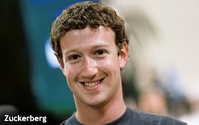 Facebook CEO Mark Zuckerberg isn’t having second thoughts about the $19 billion the company dropped last week to acquire WhatsApp. Speaking on Monday at the Mobile World Congress, he
reiterated the messaging app was well on its way to having 1 billion users—a level very few services ever reach, making it extremely valuable and worth the huge purchase price.
Facebook CEO Mark Zuckerberg isn’t having second thoughts about the $19 billion the company dropped last week to acquire WhatsApp. Speaking on Monday at the Mobile World Congress, he
reiterated the messaging app was well on its way to having 1 billion users—a level very few services ever reach, making it extremely valuable and worth the huge purchase price.
Zuckerberg
addressed the question about the WhatsApp deal as part of a keynote appearance that primarily focused on Internet.org, the initiative Facebook launched last year with partners, including Nokia,
Qualcomm, Opera and Samsung, to bring affordable Internet access to the developing world.
In a conversation with David Kirkpatrick, author of the officially sanctioned chronicle, "The Facebook
Effect: The Inside Story of the Company that is Connecting the World," the Facebook CEO emphasized that he and WhatsApp CEO Jan Koum have a shared goal of connecting everyone on the planet.
advertisement
advertisement
“It wasn’t really until we got a line on that vision that we actually starting talking about numbers and decided to make a deal,” he said. With Facebook’s 1.2 billion users
and WhatsApp’s 450 million, the companies are off to a respectable start.
Zuckerberg outlined the Internet.org blueprint: to bring online billions more in the next decade by working with
wireless operators and other partners to provide people in emerging markets with basic data services for free. That would include text-based tools and information services like messaging, search,
stripped-down social networking, weather and Wikipedia. “A lot of the goal is to create an on-ramp to the Internet,” explained Zuckerberg, noting that users might, in turn, pay limited
amounts for higher-level data services.
He noted that early results from the program show increased connectivity. In the Philippines, for example, a partnership with Globe Telecom through
Internet.org, the number of customers using the mobile Internet and data has doubled, and Globe subscribers have increased 25% in the last few months.
Customers are initially getting free
access to Facebook and Facebook Messenger services under the arrangement. A similar alliance with wireless provider Tigo in Paraguay, where the number of customers using data has increased 50%.
By upselling more full-fledged data services to people over time, Zuckerberg suggested carriers ultimately stand to benefit from the program by growing subscribers. Still, that could be a tough
sell for operators until they see further evidence of the payoff.
“There are of course indirect benefits to carriers, such as the increased mobile Internet usage and subscriber gains
experienced by Globe Telecom, but the question remains as to whether this will be enough to counter the negative impact OTT (over-the-top) services are having on operators,” noted Eden Zoller,
principal analyst at market researcher Ovum.
WhatsApp’s separate announcement
Monday that it plans to offer voice calling as well as text messaging could make operators feel even more uneasy about working directly with Internet and messaging companies they view as
undermining their core businesses.
Zuckerberg said Internet.org would like to work with three to five more carriers in the next year to provide the full range of basic services (with links to
“upsells,” or paid services) in more integrated, robust offerings for consumers. A year or two from now, his goal is to have a systematic program it can roll out more widely to mobile
operators.
In conjunction with Zuckerberg’s keynote, Facebook commissioned a report from Deloitte Touche to measure the economic and social value of connectivity. Among the main findings
were that extending Web access would create more than 140 million news jobs and lift 160 million people out of poverty.
Facebook also announced plans to create an Internet.org Innovation
Lab on the company’s Silicon Valley campus, as well as the launch of a pilot program in Rwanda called SocialEDU to provide free online education to students. It involves creation of a free
mobile app integrated with the social network.
The fact that Zuckerberg was a headline speaker at the mobile industry’s biggest conference itself highlights the company’s
increasing focus on mobile over the last two years. Mobile ads represented 53% of its total ad revenue in the fourth quarter of 2013, and Facebook had an 18.4% share of mobile advertising last year,
up from 5.4% the prior year.
Critics have accused Facebook of launching Internet.org as a benevolent cover to advance its own business interests by expanding its audience to billions more
people it can sell ads against. Zuckerberg on Monday acknowledged the company eventually stood to gain from the project, but that connecting people for their own benefit was the primary
motivation.